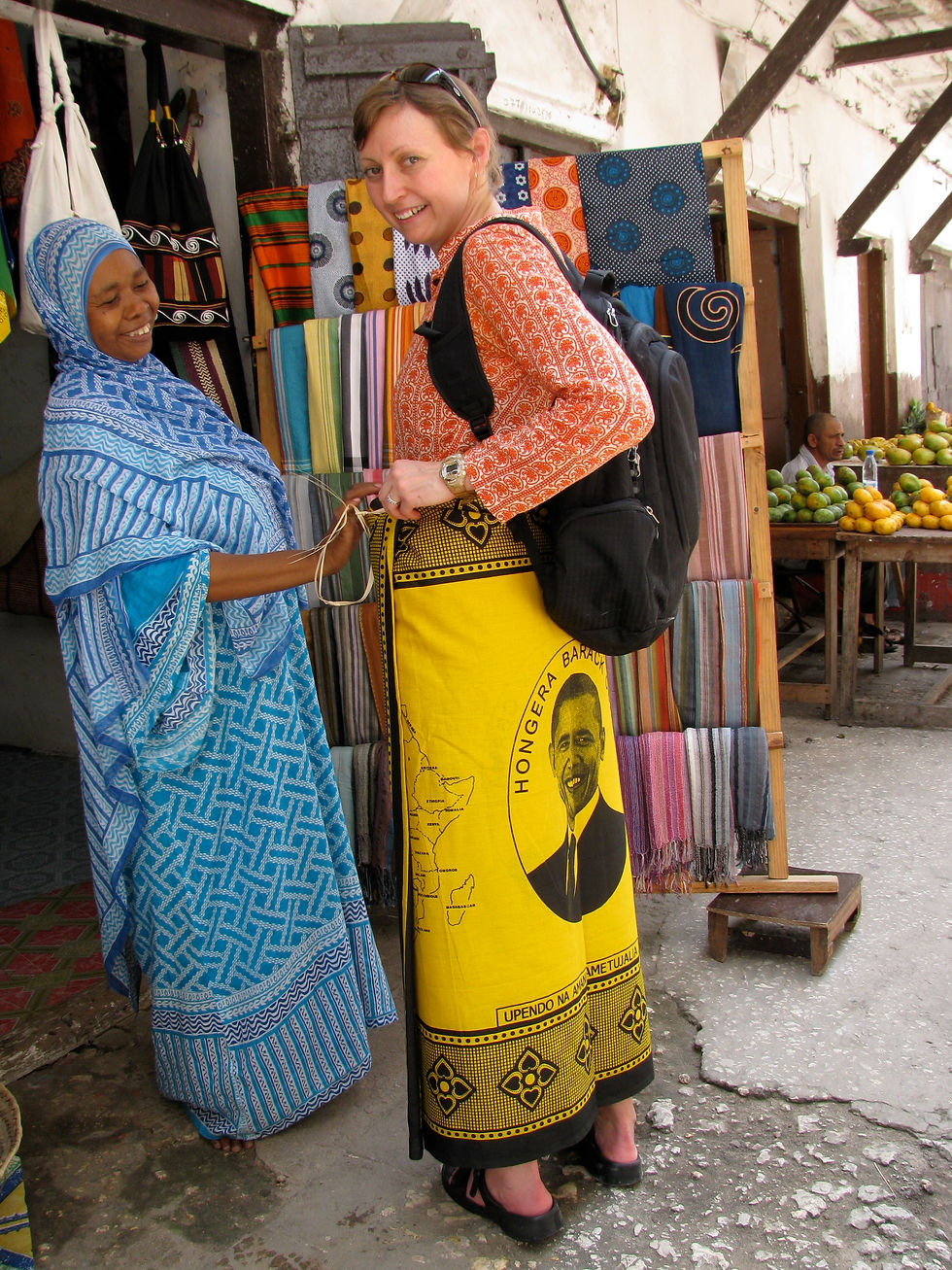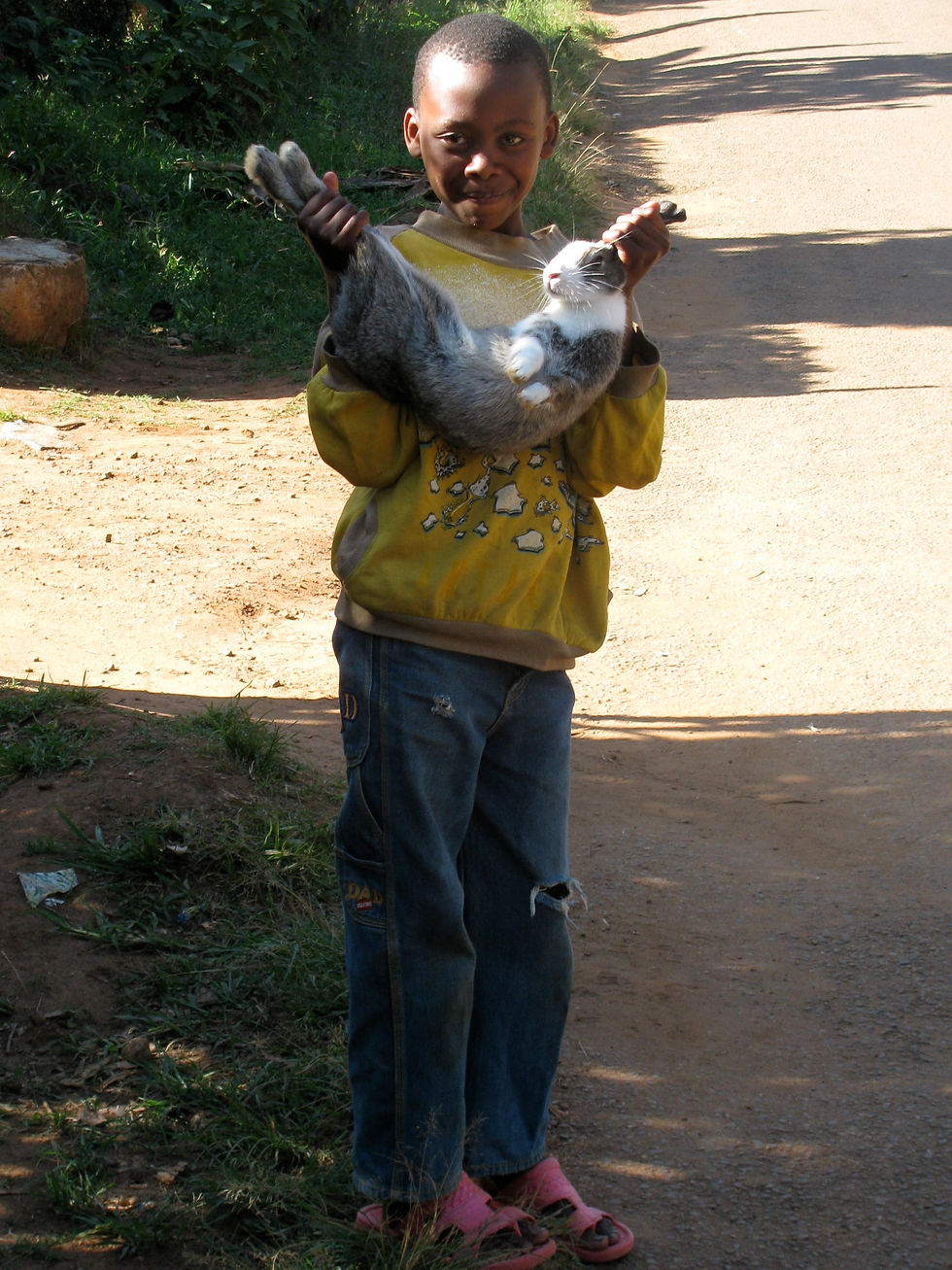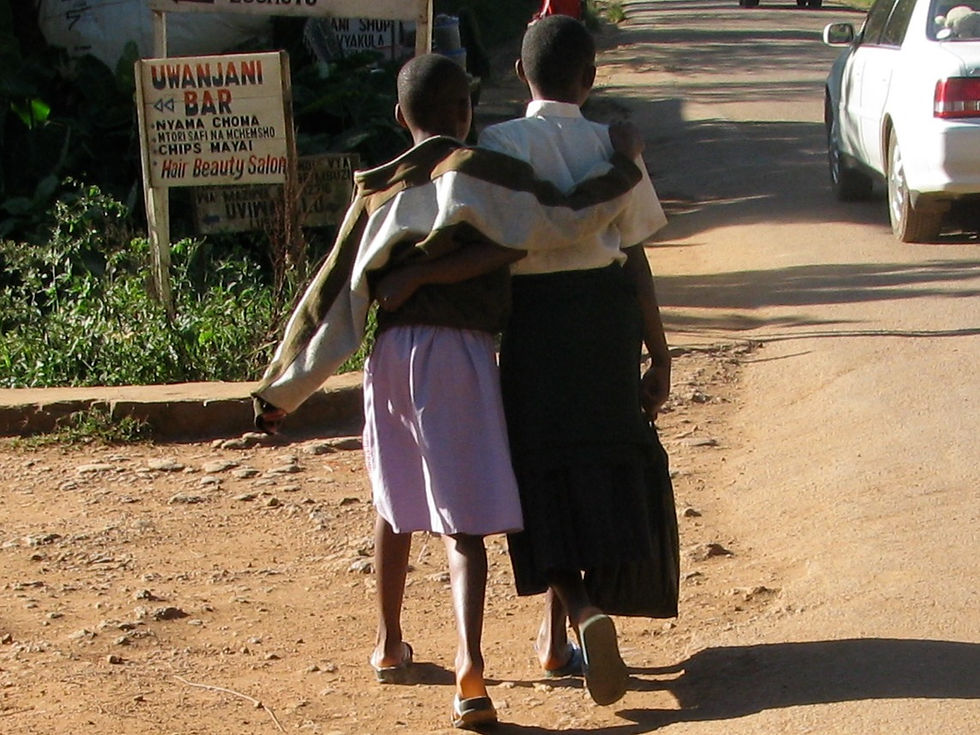Tanzania Bike Trip, 2009
- Mar 9, 2009
- 8 min read
Updated: Jul 16, 2025

Here are a few short essays from my February 2009 bicycle tour of Tanzania's Usambara & Pare Mountains.
Mad gratitude to David Mozer, director of the International Bicycle Fund, which organizes culturally immersive bike tours; David Finger, my accidental fellow-traveler; and Jerome Mwambonekeh, our wise bicycle guide.
For more photos, see this Flickr album.
Table of Contents
How I Funded This Trip

Menlo Park, CA, U.S.—Two years after a very sad divorce, I sold my engagement ring, bought a used Gary Fisher hard-tail mountain bike, and set out for a bicycle tour of northeast Tanzania, followed by a shimmy up Kilimanjaro, Africa's tallest peak, and a wildlife safari.
Diamonds weren’t forever. The platinum also passed. And so I wanted to invest in something more enduring: experience.
Selling my besmirched merch took more than a year, as the market for used engagement rings is about as hopping as turtles in a tar pit. But eventually Craigslist revealed a buyer—a lawyer of the reduce/reuse/recycle set.
We met at a bank. He paid in cash. I hadn’t predicted the awesomeness of seeing so many Ben Franklins at once, and so all I had on hand to document the moment was my craptastic cell phone. Hence this classy snap.
I also hadn’t prepared myself for the small gasp of sadness in my heart when I parted with the last vestige of my married life. The feeling passed, however, when my beaming buyer turned to me and said, “Can I hug you?” I had not anticipated the tonic of his joy.
That night he proposed to his girlfriend, who promptly accepted.
The next day, flush with cash, I put down my deposit for the International Bicycle Fund’s “Tanzania Surf to Summit” tour, prowled for used bikes on Craigslist, and started all over, all over again.
Bongo Kangas

Stone Town, Zanzibar, Tanzania—For many East Africans, a printed cotton wrap called the kanga is the go-to everyday article of clothing. The best part of the kanga is the least accessible to me: the Kiswahili proverb splashed across the middle.
In an exhibit at the local museum, I came across a kanga that sported this gem: “Mother, give me your blessings; living with people is really tough” (Mama nipe radhi kuishi na wata).
Here, a saleswoman helps me model the Obama kanga that is all the rage. Its proverb reads: “Congratulations, Barack Obama. Love and peace, may God empower you.”
But not all of the kanga proverbs are so bongo (Kiswahili for “clever”). I couldn’t resist one that the saleswoman translated simply as, “Oh, wow!” I look forward to wearing it to spice up those lackluster Mondays back at the office.
Modest Muslim Cycling Wear

Irente, Tanzania. Although Tanzania seems like a pretty tolerant place, I would feel awkward if I were shrink-wrapped in spandex when most women here are sporting ankle-length kangas, saris, or even burqas. And so I’ve settled into my modest Muslim cycling kit: loose mountain-biking pants coupled with long-sleeve cotton shirts that I picked up at FabIndia in New Delhi when I visited Dr. Lucy a few years ago. (N.B. Zanzibar is overwhelmingly Muslim, but the rest of Tanzania is predominantly Christian.)
I hope that my demure dress makes me a bit more approachable, advertising that I am not (for once) some half-nekkid wench come to upset the social order. But the question remains: Am I an inspiration to the ladies to take up their bikes and lay claim to the highways, or a cautionary tale of what happens when you don’t marry well?
Jerome and David reckoned that the answer is the latter, and suggested that we complete my kit by hanging a sign around my neck that says, “Woman for sale.” I recommended that they add “Long legs! Strong teeth! Good SAT scores!”

Meanwhile, the people I roll past do seem to admire my exertions. “No way I can do,” said a woman carrying about 50 pounds of firewood on her head. “You must be very strong,” several men have speculated.
But the surest sign of respect is the term of address I get when I’m on my bike. On foot, I am called “dada”: that is, sister. But when I’m on two wheels, I become “mama.”
All Ears

Mtae, Tanzania—The sisters in this picture followed me all the way up a steep 30-minute climb. Although I enjoyed the accompaniment of their footfalls and giggles, I found it difficult to feel like a bad-ass cyclist when three schoolgirls—all barefoot, none breathless—could so easily keep up with me.
When we reached the summit, though, only the eldest remained. She spoke her first English words to me: “Give me money.”
As I would later learn, this is a familiar refrain among Tanzanian children. Someone, somewhere has taught them the following: 1) All wazungu (white people) are crazy rich, and 2) If you say, “Give me money,” they will share their wealth with you.
I’ve asked several Tanzanian adults about this phenomenon, and they shake their heads and say that the children have bad manners. They also warn me against giving money, even if the children are desperately poor.
But I wanted to give this kid a treat because here she was, all brave and strong and fast, alone on a mountaintop with some strange white chick. From my pannier I fished out a small gift I had brought just for this occasion—a millefiori necklace that my ex-mother-in-law, a glass artist, made. I have about 20 of these left over from my marriage, and was looking forward to unloading them on the unsuspecting populace. (Agribusinesses, chemical companies, and pharmaceutical multinationals perfected this strategy long before me.)
The girl looked at the necklace, then looked at me, then repeated, “Give me money.”

By this time, Jerome, David, and I had regrouped and the other sisters had caught up. The sun was beginning to set, and we had a breathtaking view of the valleys tumbling below us.
“What are we doing here?” asked one of the girls in Kiswahili. (Jerome translated.) “These wazungu aren’t going to give us any money. In fact, they’re probably going to cut off our ears.”
Jerome chuckled and reassured the girls that we weren’t the ear-cutting-off kind of wazungu. I told him about the money-not-gift communiques I was getting from the eldest girl.
He then quietly asked her about the necklace. She didn’t say anything.
Jerome explained that she really liked the present.
“How can you tell?” I asked.
“Because she won’t show it to me and she’s hiding it from her sisters.”
Mountain Biking Is Not Road Cycling

Ndungu, Tanzania—When I signed up for this adventure, I had many miles of bike commuting and road cycling in my rearview mirror, but zero mountain biking experience. Nevertheless, I signed up for a mountain biking tour of northeastern Tanzania, thinking, "How different can it be?"
A lot different, I quickly learned on day 3 of our ride. The 40-mile journey started with a plunge down the side of a mountain in a rock-strewn, corrugated trench, with thorny brambles to my left and a plummet to my death on the right. It ended with miles of steep ravines that required me to bomb the downhill as fast as possible so that I would have enough momentum to climb the uphill. In between, boulders bounced my bike hither and thither, sand sent my back wheel shimmying, and tight switchbacks added torque to my growing terror. Meanwhile, gravity pulled the disaster ever faster. In many sections I just wanted to get off and walk, but the path was so pitched that descending on foot with my heavily laden bike was dangerous, if not impossible.

By the time we arrived at our guesthouse, all I could do was retreat to my room for a good cry and an Orange Fanta. (Tasting just like St. Joseph’s baby aspirin, Orange Fanta is the perfect accompaniment for any trauma that regresses you to childhood.) I couldn't blame IBF; they had warned there would be technical sections of the route. Instead, I had only myself to blame for endangering myself and possibly my trip buddies. One day, I told myself, this will have seemed like fun. But not today.
Shortcuts
Ndungu, Tanzania—One of the benefits of taking the local shortcuts is that they often harbor unfathomable adventure. And one of the costs of taking the local shortcuts is that they often harbor unfathomable adventure.

Consider our first shortcut: Some local men digging an ominously large hole in the road recommended that we ride through a nearby grove to carve a few clicks off our route. Three hours and 15 tire punctures later—all of which we had to patch, as we each brought only two inner tubes—we decided that bushwhacking through a thorn forest wasn’t such a swell idea, after all.
Upon completing our sojourn in the thorn forest, we decided to make up for lost time by boating across the lake in our path, rather than biking around it. The boatmen on the shore were happy to ferry us in their dugout canoes for the low-low price of $10 per person. What they didn’t mention, or maybe didn’t consider, was that their heavily patched, readily rolling tree-trunk dugouts might not be able to float a hulking mzungu with bicycle and panniers.

Nevertheless, they loaded up the first canoe with my gear and me. (Ladies first!) It took all my core muscles to counterbalance the load and perch on the stern. Even though I didn't fall into the drink, within moments, the canoe was half full of water. (See? I AM an optimist.) The captain began angrily shouting at me, but, not speaking Kiswahili, I had no idea what he was saying.

Meanwhile, back on shore, the 50 Maasai gathered for the free entertainment started laughing. My back was to them, and so I inferred that I was the source of the hilarity. I later learned that both David and Jerome had already capsized behind me, with one dugout sinking into into the muck on the bottom of the lake. Disgusted, my captain paddled back to shore, where I fished my gear out of the swampy canoe and waded back to dry land.
In the end, we cycled around the lake. Needless to say, we didn’t take any more shortcuts that day.
Small Joys

Lushoto, Tanzania—I snapped this pic of a small boy carrying a large rabbit as I wandered about Lushoto, a leafy market town nestled in the Usambara Mountains. We’d arrived earlier that day, and so I spent the late afternoon moseying around by myself. The main road was full of children walking home—from school, if they were affluent enough to attend, from elsewhere, if not.
One copse of willowy schoolgirls in their uniforms—which included a sweater, even though the temperature was well above 90 degrees F—tried out their English on me. I returned their kindness by playing photoshoot for a half hour. A digital camera with instant replay capability is a fantastic toy, especially for kids who seldom see pictures of themselves.

The girls tried out all manner of complicated configurations and cryptic gestures. As we sat reviewing our handiwork on my camera’s display, one of the girls sweetly adjusted my sunglasses on top of my head. As her fingers lingered, I figured out what she was after. And so I took down my ponytail and let all the girls touch my hair. (When I studied in Japan, several people walked right up and asked to touch my exotic dishwater locks.) Oohs and ahhs ensued. I think my manky helmet-hanks were thrilling partly because the girls had sacrificed their own hair for the privilege of attending school.

After we parted ways, I wandered back to our hotel. For part of the way, I walked behind two girls traveling with their arms around each other. Their sweet and kind behavior, like that of the other Lushoto children, touched me deeply. Sometimes, and maybe even often, the world is an okay place.




Comments